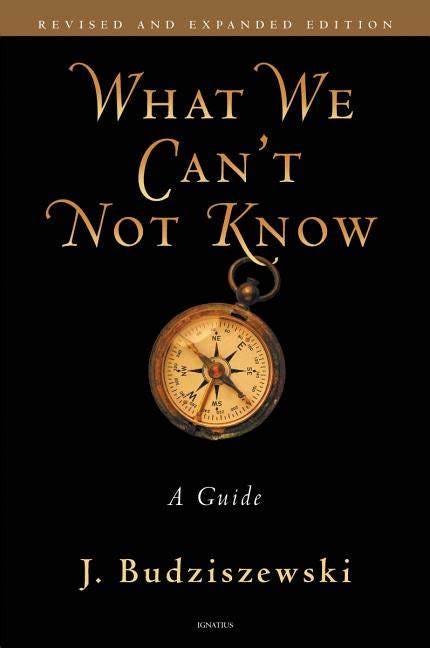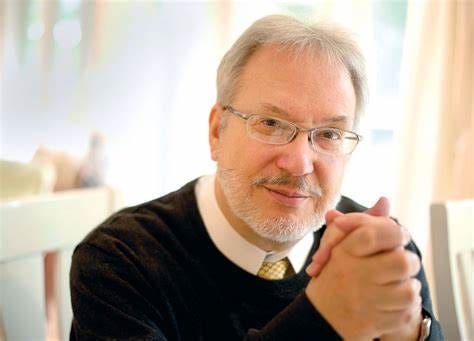Budziszewski, J. What We Can't Not Know: A Guide. 2nd. San Francisco, California: Ignatius Press, 2011.
J. Budziszewski is a professor at the University of Texas at Austin, where he teaches both government and philosophy courses. As well as teaching, Budziszewski writes extensively with What We Can’t Not Know and The Revenge of Conscience: Politics and the Fall of Man amongst some of his more recognized works. I first encountered Budziszewski’s writings when I began teaching in the classical classroom around 2011. I could spend a lot of time talking about his books which have shaped me, but this one played a significant role in my intellectual habits and my shift towards a Reformed theology.
Budziszewski does not waste any time laying out his goals for What We Can’t Not Know:
The first is bolster the confidence of plain people in the rational foundations of their common moral senses . . . The second goal is to present the explanation in such a way that all people who think and write about the common truths can achieve a firmer alliance in their defense,” (xx)
This book is a straightforward defense of natural law, and it is unabashedly Christian in its perspective. Budziszewski surveys the cultural landscape of the Western world, particularly America, and posits the consequences of continuing along the current path. As the title indicates, Budziszewski does not think truth is relative, but rather explains that there is a plurality of witnesses who demand justice, raking the individual over the coals of their conscience if they choose to ignore them.
Budziszewski’s claim is simply that no one can claim to not know right from wrong (87). He outlines four witnesses who declare the moral law that God has imbedded in nature: deep conscience, general design, our own design, and natural consequences. Each of the witnesses is inextricably linked to one another, with deep conscience serving as the foundation, or deepest part, of the witnesses (85). Budziszewski spends more time discussing deep conscience than any of the other witnesses, because “conscience presents paradoxes that the other three witnesses do not,” (149).1 The argument of What We Can’t Not Know hinges upon Budziszewski’s understanding of conscience. If natural law cannot be avoided because of this deepest witness, then the consequences of rebelling against conscience would be dire, which is precisely what Budziszewski outlines.
This book boldly declares that the moral decline witnessed by Christians in America is not the result of losing sight of truth, but rather a result of denying the principles embedded in the hearts and minds of every person created in the image of God. It is at once a scathing criticism with tragic consequences, but also a reminder that not all is lost nor is anything beyond the scope of God’s power and hope.
Budziszewski’s exploration of natural law is fascinating. Even the appendices brim with ideas and concepts that I had not previously encountered. His exposition of the Decalogue was particularly brilliant:
the biblical Decalogue, or Ten Commandments, states the most important part of the universal moral code in ideal form. If the anthropological data suggest something short of the ideal. That is not because nothing in universal, but because two universals are in conflict: universal moral knowledge, and the universal desire to evade it. The first we owe to our creation. The second we owe to our fall (29).
By laying the foundation of his theory regarding conscience at the root of the Mosaic Law, Budziszewski sets the stage for a thorough examination of the consequences of rejecting Christian ethics. This simultaneously limits his argument, but in a good way. Rather than wading into the murky waters of various disagreements (dancing, styles of dress, etc.) Budziszewski only focuses on those aspects of the ethical realm that can be seen clearly in Scripture. This is not to say what Budziszewski offers doesn’t have further implications, rather this is merely to highlight the skill of his argument: these are big picture ethical issues with eternal picture implications.
This focus on the Decalogue revived in me the need to be familiar with God’s law. In our modern American Christian character, the principle of liberty can often become a tool for licentiousness. As Budziszewski deftly points out, “the moral problem is not that we love ourselves, but that we love ourselves the wrong way,” (51). Budziszewski’s theory does not allow for cultural excuses. It does not suggest that there are no cultural issues to consider, but through his explanation of the Ten Commandments, Budziszewski paints a devastating picture which claims that all mankind is subject to the basic tenets of God’s moral law, and not a single conscience will allow anyone to escape that knowledge. Considering this, Christian ethics serves as an excellent filter through which to engage with the world and offers hope to those who might see the current societal wreckage as something that should be other than it is.
Perhaps the most challenging concept in the book is what Budziszewski calls “Eclipse.” This idea follows from his thoughts on denial, and the Five Furies of conscience. Remorse, confession, atonement, reconciliation, and justification all serve as pointers along the way towards righteousness (151-171). According to Budziszewski, when a man or woman sins, they are pursued by the furies, and must either acknowledge them, or else bury them under a pile of lies and stupidity. This was a difficult part of the book, not only because one does not necessarily want to embrace such a negative view of people, but also because of the implications. I can’t see how Budziszewski is anything but right. His examples of how we avoid the Furies, especially justification, rang true in ways that I’d wish were otherwise. Still, the denial section only set up his explanation of societal eclipse, where “an entire culture passes into the shadow,” (173).
What indeed makes a culture try to escape the deep conscience? Budziszewski does not claim to have a complete answer nailed down, but he does offer some insight here that is challenging in its scope. The loss of tradition, where unsound traditions become the accepted traditions, undermines our children (175). The cult of the expert denigrates real knowledge and artificially provides justification for a culture gone awry (178). The rise of Sophism in the public arena, particularly the university, has created a culture of fear (181-82). We have entertained ourselves into idiocy (184), we have become numb to that which should shock us (187), and we have castrated an entire generation of men, convincing them that it is better to be Peter Pan than to Simon Peter (189). Of all these though, the most troublesome is the cult of feelings. Budziszewski lists seven cults that arise out of placing too high a value on how we feel, and each one poses its own threats.
Is Budziszewski right? Is our culture really that far gone? I will let our former-Vice-President, current-President answer that: “Children in America are rewarded—not punished—for challenging the status quo . . . there is one thing that's stamped in the DNA of every American, whether they are naturalized citizens or natural-born. It's an inherent rejection of orthodoxy.”2
I am convinced that the practical aspects of Budziszewski’s theory must begin with change in individual Christian homes. While revival may have an appeal, as the Church look to the example of say Nehemiah and his reading of the Law, revival in America has typically produced short lived changes, with disastrous after effects.3 Individual Christians must recognize the deep conscience calling out to them to reject the cultural trappings, which surround us, and move towards a way of life that is more than just thinking about doing the right thing. If society is a sinking ship, should Christians head for the lifeboats? I think Budziszewski offers a resounding “No.” Instead, every attempt must be made to invite people into the conversation that makes up the Christian ethic, and genuine common ground must be explored through dialogue. But Budziszewski points out, this is not the common ground of universalism; we must reclaim the righteous land of morality back from the relativistic squatters who have shoved us out.
What We Can’t Not Know reminds us that there are some things that cannot be compromised, some ideas that cannot be ignored for the sake of love; to ignore them is not love our neighbor, but rather to love ourselves. Right thinking about morality and law must be recovered. It is not enough to legislate morality, although I think Budziszewski would consider that wise in certain circumstances like abortion. Christians must be actively engaged with pointing out the fatal flaws of current worldviews and boldly proclaiming that the Emperor has not clothes on. Budziszewski’s book denies the perfectibility of mankind through social reform and acknowledges that God’s people must stand as a bulwark against such notions., for the rule of the mob is a harsh tyrant who will not tolerate peaceful dissension. In some ways, this might be the hardest part: to strive for a God-honoring culture without falling into the trap of “reform perfection.” But it must be done.
J. Budziszewski’s What We Can’t Not Know is a vital book for every Christian to read. There is no individual who will not find a bit of himself or herself in this book and be convicted (just as I was) of the way in which they have dodged the Furies for so long. It is a call for active engagement, another point of conviction for many, and a recognition of the role that righteous thinking plays in the ethical outworking of God’s world.
Deep conscience occupies at least 48 pages of the book, which means it takes up around 20% of the book. None of the other three witnesses comes close to that.
This was part of a speech he gave to Chinese youth, encouraging them to challenge the Chinese Communist authority. The entirety of the article is worth reading, if for no other reason than thinking on Budziszewski’s claims: http://www.nbcnews.com/news/other/joe-biden-urges-chinese-students-challenge-status-quo-f2D11691581
As I’ve written in my essays on “New Theology” and “Transcendentalism,” there is a strong developmental link from The First Great Awakening to Unitarianism then to Transcendentalism. While I wouldn’t say these are causal connections, the shift from one philosophy to the next deserves careful consideration.






